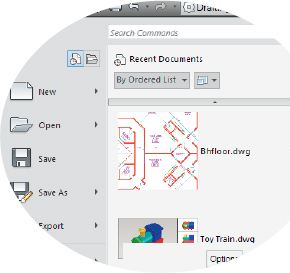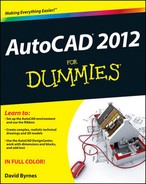2
Le Tour de AutoCAD 2012
- Touring the AutoCAD 2012 screens
- Browsing AutoCAD's menus
- Going bar hopping: title bars, the menu bar, toolbars, and the status bar
- Unraveling the Ribbon
- Navigating with Bar and Cube
- Practicing with palettes
- Discovering the drawing area
- Using online help
AutoCAD 2012 is a full-fledged and thoroughly up-to-date member of the Windows world, but if your last kick at the software was AutoCAD 2008, or you're using Windows XP, or you've yet to kick the tires of the Microsoft Office 2007 suite, you may not recognize much in AutoCAD's newest release. But the title bar says “AutoCAD 2012,” so you must be in the right place!

Like the rest of the book, this chapter is written for someone who has used other Windows programs but has little or no experience with AutoCAD. If you are experienced with recent releases of AutoCAD, some of this chapter may be old hat (even if it does look different). Here and throughout the rest of the book, I show you how to do things using AutoCAD's implementation of Microsoft's Fluent User Interface (or FUI for short). In the “Going for that classic look” sidebar later in this chapter, I show you how to make the new version look a lot like an old one.
By default, AutoCAD 2012 opens in the Drafting & Annotation workspace, and will continue to do so until you make another workspace current. (I explain workspaces in the section “And They're Off: AutoCAD's Opening Screens,” later in this chapter.) If you've been away from AutoCAD for a while, right now you may be asking yourself, “Where are my toolbars? Where is my menu?” Unlike older Windows programs, AutoCAD 2012 sports just one toolbar — the Quick Access Toolbar, on the application title bar, right next to the Application button (known informally as the “Big Red A”) — and doesn't show a menu bar in this environment. Instead, the Drafting & Annotation workspace displays two major interface items:
- The Application Menu: Clicking the Application button at the top-left corner of the AutoCAD window opens the AutoCAD 2012 Application Menu. The Application Menu presents file-related commands only; here you can create new drawings, open existing drawings, save files, or print your masterpieces.
- The Ribbon: The Ribbon replaces the menus, toolbars, many of the palettes, and the dashboard of earlier releases. Whereas the Application Menu focuses on file management, the Ribbon is where you find commands to create and modify drawing objects. The Autodesk programmers made a best guess at a task-based approach to drafting and organized the old interface items into panels of related tools.
I discuss both of these items in more detail in the following sections. For the dyed-in-the-wool traditionalists, you can reset the AutoCAD 2012 environment so it looks pretty much like it did in AutoCAD 2008. I show you how in the “Going for that classic look” sidebar, in this chapter.
